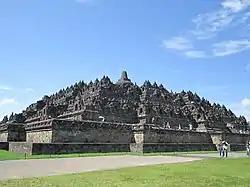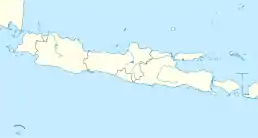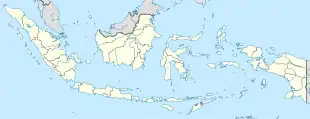Borobudur
Borobudur is a 9th century Buddhist temple in Indonesia. It is located in Magelang Regency of Central Java.[1] The temple is made of gray andesite stone and has nine platforms topped by a central dome.[2] Borobudur has 2,672 relief panels and originally had 504 Buddha statues. The central dome is surrounded by 72 Buddha statues within perforated stupas.[3] Borobudur has a complex system of stairways and corridors with 1,460 relief panels, making it one of the world's largest collections of Buddhist reliefs.[4]
| Borobudur | |
|---|---|
 Borobudur, a UNESCO World Heritage Site | |
| Location | Magelang, Central Java |
| Coordinates | 7.608°S 110.204°E |
| Built | Originally built in the 9th century during the reign of the Sailendra Dynasty. |
| Restored | 1835 |
| Restored by | Thomas Stamford Raffles |
| Architect | Gunadharma |
| Type | Cultural |
| Criteria | i, ii, vi |
| Designated | 1991 (15th session) |
| Part of | Borobudur Temple Compounds |
| Reference no. | 592 |
| State Party | |
| Region | Southeast Asia |
 Location within Java  Borobudur (Indonesia) | |
It was built during the Sailendra Dynasty's reign in Java. Borobudur blends Javanese Buddhist architecture with other indigenous Indonesian traditions. The temple was later abandoned in the 14th century when people in started to convert to Islam. Thomas Stamford Raffles rediscovered Borobudur in 1814, leading to its preservation through various restorations, including a major one in 1983 by the Indonesian government and UNESCO.[5] It is now a UNESCO World Heritage Site.[6]
Borobudur is the world's largest Buddhist temple and one of the most important archaeological sites in Southeast Asia.[7][8] It is also Indonesia's most visited monument among tourist attractions.[9]
Related pages
References
- "Borobudur | UNESCO World Heritage Site, Java, Indonesia | Britannica". www.britannica.com. 2023-11-24. Retrieved 2024-01-10.
- Indonesian News and Views. Information Division, Embassy of Indonesia. 1977.
- Soekmono (1976). Chandi Borobudur: a monument of mankind. Assen: Van Gorcum [u.a.] ISBN 978-92-3-101292-1.
- Digital Preservation of Borobudur’s Narrative Relief Wall UNESCO Seminar, Hary Gunarto, Jakarta, 2011.
- "Borobudur | UNESCO World Heritage Site, Java, Indonesia | Britannica". www.britannica.com. 2023-11-24. Retrieved 2024-01-10.
- Centre, UNESCO World Heritage. "Borobudur Temple Compounds". UNESCO World Heritage Centre. Retrieved 2024-01-10.
- "Largest Buddhist temple". Guinness World Records. Guinness World Records. Retrieved 27 January 2014.
- "Borobudur Temple Compounds". UNESCO World Heritage Centre. UNESCO. Retrieved 28 December 2008.
- Purnomo Siswoprasetjo (4 July 2012). "Guinness names Borobudur world's largest Buddha temple". The Jakarta Post. Archived from the original on 5 November 2014. Retrieved 27 January 2014.
{{cite web}}: More than one of|archivedate=and|archive-date=specified (help); More than one of|archiveurl=and|archive-url=specified (help)